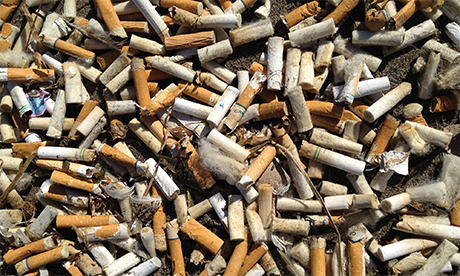Environmentalists have taken aim at the targets systematically, seeking to eliminate or rein in big sources of ocean pollution — first plastic bags, then eating utensils and, most recently, drinking straws.
More than a dozen coastal cities prohibited plastic straws this year.
Many more are pondering bans, along with the states of California and Hawaii.
Yet the No. 1 man-made contaminant in the world’s oceans is the small but ubiquitous cigarette butt — and it has mostly avoided regulation.
That soon could change, if a group of committed activists has its way.
A leading tobacco industry academic, a California lawmaker and a worldwide surfing organization are among those arguing cigarette filters should be banned.
The nascent campaign hopes to be bolstered by linking activists focused on human health with those focused on the environment.
“It’s pretty clear there is no health benefit from filters. They are just a marketing tool. And they make it easier for people to smoke,” said Thomas Novotny, a professor of public health at San Diego State University.
“It’s also a major contaminant, with all that plastic waste. It seems like a no-brainer to me that we can’t continue to allow this.”
A California assemblyman proposed a ban on cigarettes with filters, but couldn’t get the proposal out of committee.
A New York state senator has written legislation to create a rebate for butts returned to redemption centers, though that idea also stalled. San Francisco has made the biggest inroad — a 60-cent per pack fee to raise roughly $3 million a year to help defray the cost of cleaning up discarded cigarette filters.
The most littered item in the world
Cigarette butts have now also fallen into the sights of one of the nation’s biggest anti-smoking organizations, the Truth initiative.
The organization uses funds from a legal settlement between state attorneys general and tobacco companies to deliver tough messages against smoking.
The group last week used the nationally televised Video Music Awards to launch a new campaign against cigarette butts.
As in a couple of previous ads delivered via social media, the organization is going after “the most littered item in the world.”
It’s no wonder that cigarette butts have drawn attention.
The vast majority of the 5.6 trillion cigarettes manufactured worldwide each year come with filters made of cellulose acetate, a form of plastic that can take a decade or more to decompose.
As many as two-thirds of those filters are dumped irresponsibly each year, according to Novotny, who founded the Cigarette Butt Pollution Project.
The Ocean Conservancy has sponsored a beach cleanup every year since 1986.
For 32 consecutive years, cigarette butts have been the single most collected item on the world’s beaches, with a total of more than 60 million collected over that time.
That amounts to about one-third of all collected items and more than plastic wrappers, containers, bottle caps, eating utensils and bottles, combined.
People sometimes dump that trash directly on to beaches but, more often, it washes into the oceans from countless storm drains, streams and rivers around the world.
The waste often disintegrates into microplastics easily consumed by wildlife.
Researchers have found the detritus in some 70 percent of seabirds and 30 percent of sea turtles.
Those discarded filters usually contain synthetic fibers and hundreds of chemicals used to treat tobacco, said Novotny, who is pursuing further research into what kinds of cigarette waste leech into the soil, streams, rivers and oceans. Continue reading
- Image: NBC
